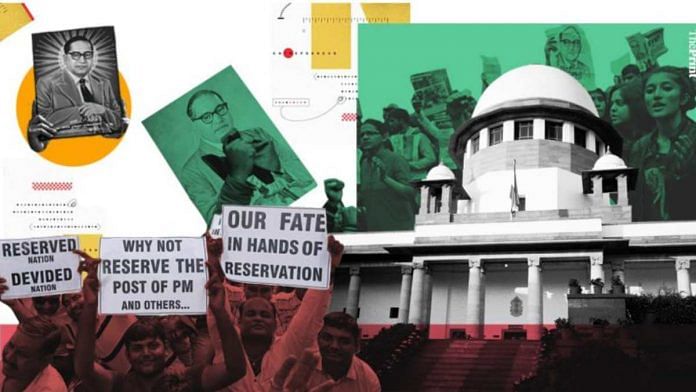New Delhi: The central government has always held that the 102nd amendment to the Constitution — which deals with the constitutional status of the National Commission for Backward Classes — applies only to the central list and states are free to have their own lists, R. Subrahmanyam, social justice ministry secretary, has said.
This was in reference to the review plea filed by the Narendra Modi government against a Supreme Court verdict, passed on 6 May, where the court ruled that states do not have the power to identify socially and educationally backward classes (SEBC) after the 102nd amendment.
With a 3:2 majority, the top court held that the amendment, which also led to the setting up of National Commission for Backward Classes (NCBC), took away states’ power to identify socially and educationally backward classes under their territory to grant quota in jobs and admissions to educational institutions.
However, in an interview to ThePrint, Subrahmanyam said: “We have always held that (the) 102nd amendment is only for the central list.
“States are free to have their lists. We still standby it. That’s why we filed a review petition as well,” he added.
Also read: Supreme Court’s flawed verdict on Maratha quota shows why factoring caste history is crucial
What SC court said
The SC verdict, on 6 May, was made by a five-judge bench while it was hearing the Maratha quota case examining the validity of a Maharashtra law, which reserved seats for Marathas in jobs and educational institutions.
While the bench unanimously struck down the law, there was a split verdict on the question of the interpretation of articles 338B and 342A, inserted by Constitution (102nd Amendment) Act 2018.
The 102nd amendment gives constitutional status to the National Commission for Backward Classes. Article 338B deals with the structure, duties and powers of the commission while 342A gives the President the power to notify a class as SEBC and the power of Parliament to alter the central SEBC list.
The SC’s majority verdict on the interpretation of these provisions noted that states do not have the power to identify SEBCs.
It held that after the introduction of articles 338B and 342A to the Constitution, “The final say in regard to inclusion or exclusion (or modification of lists) of SEBCs is firstly with the President, and thereafter, in case of modification or exclusion from the lists initially published, with the Parliament”.
However, the Modi government, as evidenced by Subrahmanyam’s remarks, is not in agreement with the SC verdict.
During the hearing, Attorney General K.K. Venugopal, appearing for the Centre, had also argued that this was not the intention of the law. “It is inconceivable that no State shall have power to identify backward class,” he said.
He had further argued that state governments will have their separate list of SEBCs for providing reservation in state government jobs and education, whereas Parliament will only make the central list of SEBCs that would apply for central government jobs.
Also read: Backward classes panel bats for OBC census, says data will ensure welfare measures reach all
New SEBC list
Meanwhile, by holding that the 102nd amendment took away states’ power to identify SEBCs in their territory, the court has laid the groundwork for a new SEBC list for all states and Union Territories to be notified by the President.
The court held that the President should “expeditiously” publish the list of SEBCs for different states and UTs, under Article 342A, after consultation with the commission set up under Article 338B.
Subrahmanyam, however, said that no deadline has been fixed for notifying the central list yet. “It is the government’s prerogative to prepare the SEBC list. We are waiting for [the] Rohini Commission report before we notify [the] central list of OBCs.”
The Rohini Commission was constituted by the Centre in 2017 under former Delhi High Court Chief Justice, G. Rohini to examine the sub-categorisation of OBCs.
The commission has already got several extensions, with the latest granted by the Union Cabinet in January 2021. The commission is now expected to give its report in July.
At present, a 27 per cent quota is set aside for OBCs in jobs and seats in central government-funded educational institutes.
Also read: No plan to amend manual scavenging law, govt says 6 months after announcing new bill



